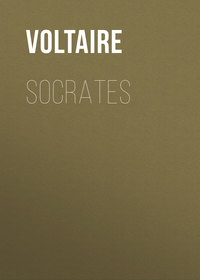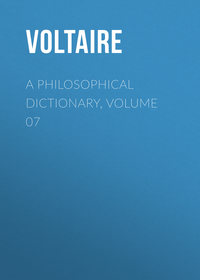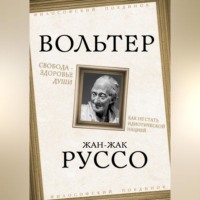
Voltaire's Romances
30
In the Play, Civilization, the Huron musingly soliloquizes:
"And what is love to man? An only giftToo precious to be idly thrown away!For is it not as precious as our land,Which, heeding not another's golden sky —Soft airs, sweet flowers, hill and dale conjoin'dBy nature's cunning past comparison —Is still our land; and, as our land, surpassesFar such fairy worlds?"There are some dreams that last a life – mineIs one of these. I shall dream on till deathShall end the vision!"It is not hard to die! And life is butA shadow on the wall – a falling leafToy'd with by autumn winds – a flower – a starAmong the infinite, infinitesimal!We are but breath whispering against the wind, —Sand in the desert! – dew upon the sea!" – E.31
"It was," says Gibbon, "at the feet of his legate that John of England surrendered his crown; and Innocent may boast of the two most signal triumphs over sense and humanity, the establishment of transsubstantiation, and the origin of the inquisition."
32
Perhaps it would be impossible at the present day to convince scientists that oysters formerly conversed intelligibly with mankind and protested eloquently against human injustice; but all men are not scientists, and there are many worthy people who still have implicit faith in ancient Semitic records – who firmly believe in miracles and prodigies – and who would consider it rank heresy to doubt that the serpent, though now as mute as an oyster, formerly held a very animated conversation, in the original Edenic language, with the inexperienced and confiding female who then graced with her charming presence the bowers of Paradise; and this sacred narrative of the "maiden and the reptile" is quite as repugnant to modern science as the sentimental fish story of "Pythagoras and the oyster".
As a matter of fact, the doctrine of the metempsichosis, as taught by the Samian sage, was formerly held in great repute by the most civilized nations of antiquity, and it is surely as easy to credit the assertion of our author, that the ancient Gymnosophists "had learned the language of beasts and plants" as to believe the unquestioned and orthodox statement that a certain quadruped, (Asinus vulgaris,) – whose romantic history is recorded in the twenty-second chapter of Numbers, – was once upon a time able to converse in very good Hebrew with Monsieur Balaam, an ancient prophet of great merit and renown. – E.
33
The resemblance of oysters to mankind, here implied, can only be apparent to the "eye of faith," and lovers of these delicious bivalves will fail to recognize the family likeness. – E.
34
Pythagoras was born at Samos, about 590 years before the Christian era. He received an education well calculated to enlighten his mind and invigorate his body. He studied poetry, music, eloquence and astronomy, and became so proficient in gymnastic exercises, that in his eighteenth year he won the prize for wrestling at the Olympic games. He then visited Egypt and Chaldea, and gaining the confidence of the priests, learned from them the artful policy by which they governed the people. On his return to Samos he was saluted by the name of Sophist, or wise man, but he declined the name, and was satisfied with that of philosopher, or the friend of wisdom. He ultimately fixed his residence in Magna Græcia, in the town of Crotona, where he founded the school called the Italian.
This school became very prosperous, and hundreds of pupils received the secret instructions of Pythagoras, who taught by the use of ciphers or numbers, and hieroglyphic writings. His pupils were thus enabled to correspond together in unknown characters; and, by the signs and words employed, they could discover among strangers those who had been educated in the Pythagorean school. All the pupils of the philosopher greatly reverenced their teacher, and deemed it a crime to dispute his word. One of their expressions "thus saith the Master," has been adopted by modern sects.
The Samian sage taught the doctrine of the metempsichosis, or the transmigration of the soul into different bodies, which he had probably learned from the Brahmins; who believed that, in these various peregrinations, the soul or thinking principle was purged from all evil, and was ultimately absorbed into the Divine substance from which it was supposed to have emanated.
Godfrey Higgins in the Anacalypsis cites authorities to prove that the doctrine of the metempsichosis was held by "many of the early fathers of the Christians, which they defended on several texts of the New Testament. It was held by Origin, Calcidius, Synesius, and by the Simonians, Basilidians, Valentiniens, Marcionites, and the Gnostics in general. It was also held by the Pharisees among the Jews, and by the most learned of the Greeks, and by many Chinese, Hindoos and Indians.
"When all the circumstances relating to Pythagoras and to his doctrines, both in moral and natural philosophy, are considered," continues Higgins, "nothing can be more striking than the exact conformity of the latter to the received opinions of the moderns, and of the former to the moral doctrines of Jesus Christ."
"The pupils of Pythagoras," says Eschenburg, Manual of Classical Literature, "soon amounted to 600, dwelt in one public building, and held their property in common. Under philosophy, the Italic school included every object of human knowledge. But Pythagoras considered music and astronomy of special value. He is supposed to have had some very correct views of astronomy, agreeing with the true Copernican system. The beautiful fancy of the music of the spheres is attributed to him. The planets striking on the ether, through which they pass, must produce a sound; this must vary according to their different magnitudes, velocities, and relative distances; these differences were all adjusted with perfect regularity and exact proportions, so that the movements of the bodies produced the richest tones of harmony; not heard, however, by mortal ears."
Pythagoras taught, and his followers maintained, the absolute equality of property, "all their worldly possessions being brought into a common store". The early Christians had also "all things in common," and the doctrines of Jesus and Pythagoras have many points of resemblance. Both were reformers, both sought to benefit the poor and the oppressed, both taught and practised the doctrines now known as Communism, and both, for their love to the human race, suffered a cruel martyrdom from an orthodox and vindictive priesthood.
In obedience to an oracle, the Romans, long after the death of Pythagoras, erected a statue to his memory as the wisest of mankind. – E.
35
Godfrey Higgins in the Anacalypsis draws aside the veil of Isis, and explains in a satisfactory manner the reason why Pythagoras, like Socrates and Jesus, was condemned to death by the established priesthood. Each of these great reformers had been initiated into the sacred mysteries, and each taught his followers by secret symbols or parables that contained a hidden meaning; so "that seeing the uninitiated might see and not perceive, and hearing might hear and not understand." The reason that Jesus gave for following this method was "because it is given unto you (i. e. the initiated) to know the mysteries of the kingdom of heaven, but to them (i. e. the people) it is not given." (Matt. XIII: II.) The mass of mankind, being excluded from this secret knowledge, were kept in a state of debasement as compared with the favored few who were acquainted with the jealously guarded secrets of the Cabala; and the earnest desire of these great reformers – of these noble men who cheerfully gave their lives to benefit their race – was, without divulging the secrets of their initiation, to teach mankind to partake of the forbidden fruit of the tree of knowledge, and to learn "that a virtuous life would secure eternal happiness." Such philanthropic doctrines were denounced as wicked and heretical by the orthodox priesthood, who instinctively oppose human progress, and who, like the silversmith of Ephesus, described by St. Paul, felt that "this our craft is in danger" should the people become enlightened. They therefore, excited a popular clamor, and aroused the worst passions and prejudices of their followers; who, inspired with fanatic zeal, cruelly and wickedly burned Pythagoras of Crotona, poisoned Socrates of Athens, and crucified Jesus of Nazareth. – E.
36
The reader will perceive that this is a spirited satire on mankind in general, and particularly on persecution for conscience sake. —Trans.
37
Alluding to the infamous practice of poisoning and assassination at that time prevalent in Rome. —Trans.
38
This was the famous Concini, who was murdered on the draw-bridge of the Louvre, by the intrigues of De Luines, not without the knowledge of the king, Louis XIII. His body, which had been secretly interred in the church of St. Germain de l'Auxerrois, was next day dug up by the populace, who dragged it through the streets, then burned the flesh, and threw the bones into the river. The marshal's greatest crime was his being a foreigner. —Tr.
39
Referring to the massacre of Protestants, on the eve of St. Bartholomew. —Tr.
Brahma, the Creator. – Vishnu, the Preserver. – Siva, the Destroyer.
40
In Rev. XII: 3, 4, the Dragon is represented as deftly seizing one-third of the stars of heaven with his tail, and rudely wresting them in dire confusion from the celestial spheres. – E.







